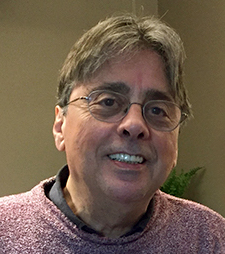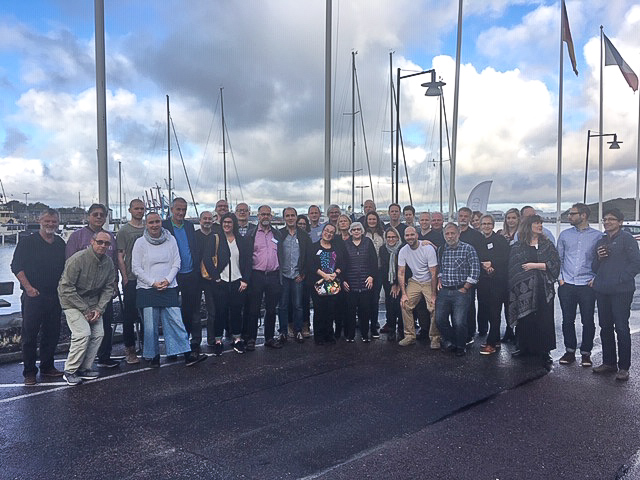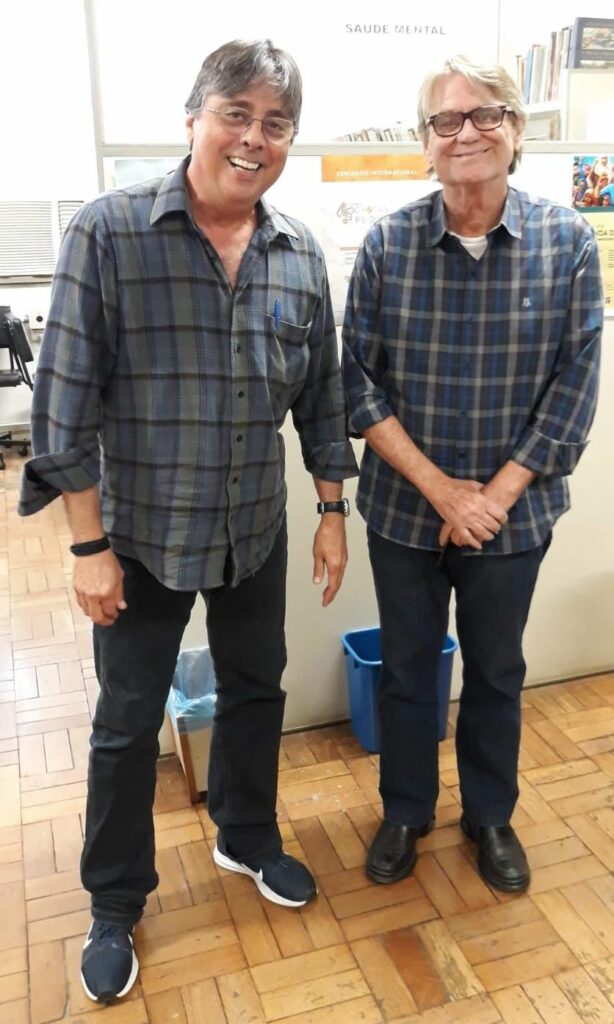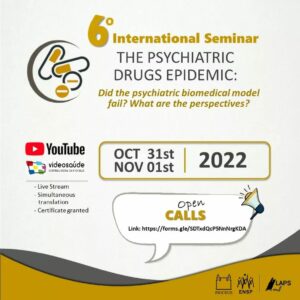Over the past decade, the call for radical change in psychiatry has grown louder and more organized, and in Latin America, there was no voice that was louder—or more effective—than that of Fernando de Freitas and his colleague Paulo Amarante. Together, they led a critical psychiatry effort of great scope; they launched Mad in Brasil in 2016; and they became associates of the International Institute for Psychiatric Drug Withdrawal (IIPDW) when it was founded, with Fernando traveling to Gothenburg, Sweden for its inaugural meeting.

Fernando, at age 68, passed away this past Monday, January 30, after a six-month struggle with pancreatic cancer.
As news of Fernando’s death spread—to his colleagues in Brasil, to the Mad in America community, to the members of the IIIPDW, and beyond—there was a common sentiment in their expressions of grief: Fernando de Freitas was a “dear friend,” who left his mark on all those who had the good fortune to know him, and he was a warrior for radical change.
Here are just a few of the tributes:
From the UK:
“I first met Fernando in Gothenburg and we corresponded thereafter where he introduced me to others and we discussed many issues. I found in him a fellow traveler not only in the politics of mental health, but politics more broadly. He was such a lovely and generous person. People who provide the sort of solidarity he did are precious and his loss will be keenly felt in many places around the world.” —Sami Timimi
“What terribly sad news. I never met Fernando in person, but thanks to zoom, had several remote conversations with him. He was so warm, friendly and funny—that is my memory of him. Even on zoom his exuberance and passion overflowed. We have really lost a charismatic and energetic campaigner for change in mental health, social justice and politics more generally.” —Joanna Moncrieff
“He was a kind and generous host when I visited Brazil a couple of years ago. He was very well-informed about politics, and we shared our disgust at the state of the UK’s ruling party, and delight at the re-election of his beloved Lula. He will be very much missed.” —Lucy Johnstone
From Iceland:
“I felt his love and friendship from the first moment. We had many conversations in Gothenburg and we kept our contact via messenger. I miss him deeply.” —Audur Axelsdottir
From The Netherlands:
“We are losing a friend with a great heart.” —Peter Groot
“We will miss him. He was always an inspiring person in the online meetings. He planted seeds; may other people ensure they continue to get attention and grow.” —Monique Timmermans
From Switzerland:
“My deepest condolences for the loss of a good human being, a dedicated human being, and for Brazil—the country where I grew up—that loses a good person and fighter for making this world a better place.” —Claudia Esteve
From Finland:
“I’m a Buddhist so I believe in karma. May his many good deeds continue to grow and flourish and help us achieve the vital paradigm change in psychiatry.” —Soili Takkala
From Norway:
“I met him in Gøteborg, and he was a great inspiration to me to start Mad in Norway. I had great conversations with him, he was so warm and supportive. A wonderful man, and an inspiration to us all. The entire staff of Mad in Norway send our condolences, he is a great loss to our community.” —Birgit Valla
From Italy:
“This news saddens me greatly. And it saddens me even more that it was impossible to send Fernando our hug and our words of esteem at the time of his illness. I never had the chance to meet him in person, but I was struck by his sense of purpose, curiosity, knowledge about Basaglia (more than many Italians) and ability to connect even online.” —Raffaella Pocobello
From Sweden:
“Fernando was one of the kindest (people) but also very determined to make a change for a better world. I have such beautiful memories from our days together in Gothenburg.” —Carina Hakkansson
From Germany:
“A real loss—his legacy survives him and all those touched by his kindness and generosity. We are dedicating our book Withdrawal from Prescribed Psychotropic Drugs (with his terrific contribution ‘Attitudes of researchers concerning the discontinuation of psychopharmacological treatment’) to him—due out in two weeks.” —Peter Lehmann & Craig Newnes
From the US:
“Fernando was a wonderful companion on my trip to Brazil and helped with my antipsychotic research. We had a number of vibrant conversations and he brought a really strong spirit to the work and the world. I had no idea he was ill. A real loss.” —Will Hall
“I am really saddened to hear of Fernando’s death. We met at Gothenburg and he, Kleo and I were the only people who stayed an extra day and got to really bond with each other. We never met again but stayed in touch via email and social media. He exuded a firm sense of purpose with a deep warmth and kindness. It is a huge loss to our community.” —Swapnil Gupta
And from Brasil:
“I deeply regret the death of our dear friend Fernando Freitas, because he was one of those rare people who knew how to fight for his convictions, creating spaces for debate, discussion forums, and solidarity networks aimed at strengthening a permanent questioning of the abuses of power of biological psychiatry and the problems derived from psychopharmacological treatments, such as severe adverse effects, dependence and addictions that are often systematically denied. As a reader and contributor to Mad in Brasil, I feel an enormous sadness because we lost a tireless worker, editor, translator, and writer on pressing current issues in the field of mental health. Fernando had to deal with intolerant critics even among those considered humanist psychiatrists. I highlight his latest collaboration, which has just been published in a Dossier organized by Marcia Mazon and myself, in the Brazilian journal Estudos de Sociologia. In the last issue of the year 2022, we can find what is probably the last publication of Fernando Freitas, written in collaboration with Luciana Jaramillo Caruso de Azevedo and entitled ‘Medicalizando crianças e adolescentes’ (Medicalizing children and adolescents).” —Sandra Caponi
As for me personally, I have shed more than a few tears this past week. Here is how he often signed off in his emails, which tell of the warmth he regularly showed to others: “Um forte abraço, meu caro amigo.”

Fostering Critical Psychiatry in Brasil
Fernando Ferreira Pinto de Freitas earned his PhD in psychology, with a focus on social psychology, from the Université Catholique de Louvain in Belgium. He and Paulo Amarante first met in 1982 when Fernando took a course Amarante taught on mental health and psychosocial care. For Amarante, this was “the pioneering course that started the process of criticism in psychiatry—criticism of the model of asylum psychiatry and medicalization in Brazil.”
Together with other activists inspired by the work of Franco Basaglia in Italy, who had gained fame for abolishing psychiatric hospitals in that country, they helped foster a deinstitutionalization effort in Brasil. In the late 1980s, Amarante was a principal author of national legislation that provided for community treatment of psychiatric patients and sought to protect their human rights.
In 2007, Freitas and Amarante joined forces to create a mental health and human rights forum in cooperation with the Universidad de las Madres de Plaza de Mayo in Argentina. This was a first step toward moving beyond the psychiatric reform that had taken place in the 1980s, when asylums were mostly supplanted by a nationwide network of Psychosocial Care Centers (known as CAPS.) Next, Freitas and Amarante co-founded the Associação Brasileira de Saúde Mental (ABRASME). For a time, Freitas was the director of ABRASME, which is the largest “critical” mental health entity in Latin America. Under their joint leadership, ABRASME held annual conferences, which were designed in part to help foster a user-led movement in Brazil.

This is how I first came to know Fernando and Paulo, as they invited me to speak at ABRASME conferences held in Manaus, Joao Pessoa, Florianopolis, and Rio De Janeiro. It was then that I experienced the warmth, friendship and generosity that so many, in their tributes to Fernando, wrote about.
One of the most memorable events at an ABRASME conference came during a talk by Olga Runciman, who told of her recovery after having been hospitalized with a diagnosis of schizophrenia, and that her recovery occurred after she stopped taking antipsychotics. Many in the audience had never heard of such a thing, and her talk was the equivalent of dropping a rock into the still waters of a pond. You could see the ripple of emotion spreading through the audience and internal “lights” flashing on as her words sunk in.
“I first met Fernando when I was invited by him and Paulo Amarante to Brazil in 2015,” Runciman recalled. “I was welcomed not just into Brazil but his home where we spoke about the state of the world and in particularly psychiatry and its drugs, and I discovered here was someone else who shared a passion for wanting to change the world with regards to the rights and needs of those suffering in psychiatry. It turned out we both shared a dream that one day there would be a movement to support withdrawal from psychiatric drugs. Little did we know that a year later that dream would become true! The IIPDW was born and Fernando became an associate of our institute and played a very active role in Brazil promoting drug withdrawal.”
As Freitas and Amarante pursued these initiatives, they did so from within the most prominent institution of science and technology: the National School of Mental Health of the Oswaldo Cruz Foundation (FIOCRUZ). Both were professors at the school, and Amarante also directed a Laboratory of Studies and Research in Mental Health at Fiocruz. Freitas was one of the lab’s researchers.
Through their efforts, Editora FIOCRUZ published a Portuguese translation of Anatomy of an Epidemic, with Freitas and Amarante co-writing the preface. In 2016, they jointly launched Mad in Brasil, with Freitas serving as its managing editor.
In an interview with Mad in America last year, Freitas told of how they wanted Mad in Brasil to promote a transformation of mental health care. “[We want] to promote, to create, a radical rupture—a break—a radical rupture in our relation to the psychiatric model,” he said. Even in a community-centered approach, the medicalized elements—the reliance on diagnosis, the emphasis on drugs—needed to be questioned.
“To reflect, to re-think, to question. We want to change the conversation,” he said.
Freitas was a tireless editor. He regularly translated science articles, personal stories, and blogs that had been published on Mad in America and other affiliate sites into Portuguese. His assistant, Camille Mota, regularly published reviews of articles published in Brazil’s medical journals. In his six years at the helm, Freitas translated more than 700 articles—blogs, personal stories, and MIA reports—with his last translation published on January 16, little more than a week before his death. Mad in Brasil developed a steady monthly readership—visitor numbers typically averaged around 20,000 a month.
“Two weeks before Fernando passed away he was posting on Mad in Brasil,” Runciman said. “His passion for change in mental health was there until the last.”
What was unique about Mad in Brasil was that it was based in the leading institution of science and public health in Latin America, FIOCRUZ. By way of analogy, try imagining prominent researchers and leaders of the National Institute of Mental Health in the United States serving as editors of Mad in America, and publishing science news, blogs, personal stories, and in-depth reports that tell of the failures of psychiatry’s disease model, and the need for radical change. This would never happen, of course, and this highlights an important aspect of what Mad in Brasil brought to this Mad in the World enterprise (and to the IIPDW): The effort to radically transform psychiatry in Brazil had its footing in a prestigious institution of public health, led by professors at that institution.
 After launching Mad in Brasil, Freitas’ and Amarante’s next project was to create a yearly “International Seminar on the Epidemic of Psychiatric Drugs.” They put together six such conferences, which typically involved inviting an international group of researchers, people with lived experience, and practitioners to give talks (first through in-person presentations in Brazil, and then online during the pandemic.) Their Brazilian colleagues also gave talks. The list of international speakers includes many names familiar to Mad in America: Irving Kirsch, Laura Delano, Will Hall, Joanna Moncrieff, John Read, Lucy Johnstone, and Jaakko Seikkula, to name just a few. This past November, for the sixth such international seminar, they invited Allen Frances and Andrew Scull to a debate on the merits of psychiatry and its treatments.
After launching Mad in Brasil, Freitas’ and Amarante’s next project was to create a yearly “International Seminar on the Epidemic of Psychiatric Drugs.” They put together six such conferences, which typically involved inviting an international group of researchers, people with lived experience, and practitioners to give talks (first through in-person presentations in Brazil, and then online during the pandemic.) Their Brazilian colleagues also gave talks. The list of international speakers includes many names familiar to Mad in America: Irving Kirsch, Laura Delano, Will Hall, Joanna Moncrieff, John Read, Lucy Johnstone, and Jaakko Seikkula, to name just a few. This past November, for the sixth such international seminar, they invited Allen Frances and Andrew Scull to a debate on the merits of psychiatry and its treatments.
Together, Freitas and Amarante co-authored a number of articles and books, and prepared pamphlets for ABRASME on the medicalization of life that flowed from the third edition of the American Psychiatric Association’s Diagnostic and Statistical Manual. Most recently, they oversaw the translation of Jaakko Seikkula’s book on Open Dialogue, and co-wrote a preface for the book.
The Medicalization of Life
As can be seen in the brief bio, Fernando Freitas devoted his professional life seeking to transform psychiatric care in Brazil and beyond. He did this through a remarkable and lasting friendship with Paulo Amarante.
There of course was a personal side to being invited into their world, and as the sentiments above bear witness to, Fernando left his mark on all he met. His warmth, his intelligence, his passion, and his capacity for friendship were the defining traits of his character. Plus, he had a great sense of humor and infectious laugh.
For Freitas, Amarante, and other Brazilians that organized and spoke at these events, the most prominent theme was the medicalization of life, and the loss—for a society, for its children, and for all—that comes from that pathologizing of the human condition. As Freitas and Amarante intimated in their 2015 book The Medicalization of Psychiatry, it led to an impoverished sense of self (and other harms), and it was this big-picture belief that animated all of their efforts.
Mad in America published a review of Fernando’s latest writing on this subject, which Sandra Caponi mentions above, on January 6 of this year.
Fernando is survived by a daughter, Natalia, and a step-daughter, Lara. As the expressions of grief reveal, his death is a loss for all who wish to see psychiatry “radically transformed.”












إِنَّا ِلِلَّٰهِ وَإِنَّا إِلَيْهِ رَاجِعُونَ
Report comment
“….an impoverished sense of self….”
THAT’S the defining feature of “psychiatry” and “psychology”.
Report comment
Thanks for sharing this Bob. Wish I had met this wonderful man he sounds like a true mensch and his work and passion is now well rooted to grow.
Report comment
My condolences to Fernando’s friends and loved ones. Thank you for sharing some about Fernando’s life and good works, Bob.
Report comment
https://youtu.be/Iw7Xz-wl5Lo
Hello Robert,
I am sorry to hear of the loss of your dear friend. The battle to turn the tide against over prescribing is finding a new niche in covid. Very concerning about this next drug being promoted as a receptor regulator. Someone more medical than me ought to reach out to these men and counter their naive quest methinks. This video got 84,000 people tuning in to it. And over a thousand gullible positive comments. Worth a watch through as they start talking about this drug’s use in depression and anxiety.
I myself am doing fine and am tapering off my antipsychotic. I needed to revisit being back on that medication and it did not take me a few months to realize again how insufferable the side effects are. I will say that my new breed of psychiatrist had no qualms whatsoever about helping me come off the antipsychotic and it was her who suggested that rather that cut my pills in secret I might like a liquid form of the drug with a syringe to get it down to mico doses and then sail free of it. My psychistric nurse is also all in favour of my choice.
But yes this video is a worry. Only one in a hundred or so may take antipsychotics that affect their receptors but covid? Every age group in the global population has had covid. Big market. These genuinely decent nice medical men are sleep walking into that even though their channel is popular because it is about debunking the Pffeizer vaccine and Big Pharma.
Take care.
Report comment